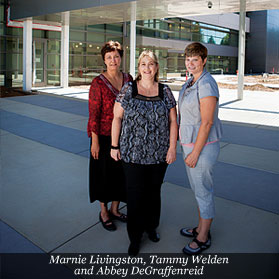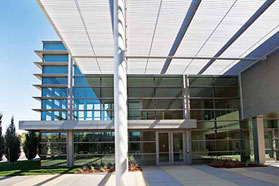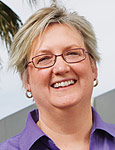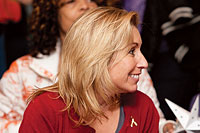Donor-employees commit to Comprehensive Cancer Center growth
 "I have my life to live; I hope to make whatever little difference in someone else’s life I can."
"I have my life to live; I hope to make whatever little difference in someone else’s life I can."
Taken together, the four women have pledged $35,000 in recent months. They are among a growing number of health system employees who have made gifts to the Cancer Center building project, research or clinical programs.
"Employee donors are contributing to patient care, research, clinical trials and everything else that makes up the cancer center," says Michele Steiner, associate director of development for the UC Davis Comprehensive Cancer Center. "More importantly, they help with community involvement; their donations demonstrate that they are investing in the future health of the community. No gift is considered too small and we appreciate every gift that is received."
Livingston, executive assistant to division of pain medicine chief Scott Fishman, is donating $5,000 to the Cancer Center expansion to honor her surgical oncologist, James Goodnight, now associate dean for clinical affairs.
 They are among a growing number of health system employees who have made gifts to the Cancer Center building project, research or clinical programs.
They are among a growing number of health system employees who have made gifts to the Cancer Center building project, research or clinical programs.
"I would not have made it without Dr. Goodnight’s compassion and concern for my care," says Livingston, a single mother who was treated for breast cancer in 2007. "I was so happy; everyone was so nice and caring, including the staff at the front desk. I am donating because I want to make sure that other people can get the kind of care that I received."
Livingston underwent six weeks of radiation therapy, five days per week, while working full-time and as a single mother with two boys, ages 12 and 15. Her boys cleaned the house while she was undergoing radiation therapy.
"I was very proud that my children helped me whenever I needed it," says Livingston.
Livingston says she was lucky that her tumor was found early. "I was at stage 0, which was very easy to treat with a lumpectomy and radiation," she says, "Dr. Goodnight ordered another mammogram six months after I finished my radiation and found that there was no sign of cancer."
DeGraffenreid, who works on the performance, improvement and safety team for perioperative services, had six months of treatment for lymphoma, which included chemotherapy and radiation. But she says she didn’t let the disease control her, and continued working full-time throughout, using a laptop, during her five-hour chemotherapy sessions.
"The thing that gave me the most hope was learning that I had a very treatable form of lymphoma," she says. "All of my doctors were always very positive and supportive."
DeGraffenreid will donate $5,000 to honor Goodnight, $2,500 to name an infusion chair in the expanded center and $2,500 to lymphoma research.

"As someone who received the generosity of others, I knew it was time for me to give back to the cancer center when it was expanding."
"I have my life to live; I hope to make whatever little difference in someone else’s life I can," says DeGraffenreid. Asked what she has to be thankful for, she says, simply, "my life."
Welden,an administrative assistant at the UC Davis Comprehensive Cancer Center, has committed $5,000 to the expansion of clinics and infusion center, plus $5,000 for two infusion chairs, which will bear her name.
Welden’s commitment to the medical center began in 2006 when her 15-year-old son, Anthony, was hit by a pick-up truck and dragged 150 feet. The accident left him in a coma.
"The nurses told me, ‘never give up,’" she says. "Through four long months of hospital visits and lots of prayer, we never did. We knew he would be all right. It was just a matter of when he would wake up."
Initially, Anthony was cared for at the hospital’s intensive care unit. He was transferred to a sub-acute facility in Saratoga, Calif., where he finally woke up from his coma. Welden then decided she wanted to get involved in whatever way she could.
Welden joined the health system staff in March 2008, and is now working full-time at the Cancer Center. Welden also volunteers at UC Davis events and at her church.
"I am always looking for ways to help out," she says, "Unfortunately it isn’t as often as I would like."
Her son, now 22, is a student at American River College and has made dramatic progress in his physical rehabilitation.
"He doesn’t have to use his wheelchair very much anymore," she says. "He can eat solid foods now, too. He has to swallow in a certain way, but he no longer needs a feeding tube."
Wolf, nursing and quality coordinator for the UC Davis Health System Cancer Care Network and a former clinical resource nurse in the department of radiation oncology, has committed $10,000 to name a discharge station in the expansion.
"As a nurse, I know the importance of a great organization and part of that comes from what donors contribute," says Wolf. "Because of these contributions, we basically didn’t have to pay anything for our graduate education."
Wolf and her classmates at the UC Davis Betty Irene Moore School of Nursing received grants from the Gordon and Betty Moore Foundation, which committed $100 million toward nursing education. As a student in the first class of the nursing school, Wolf understands that part of being a leader means being generous.
"I also received the Pat and Charles Fullerton Pain Scholarship for two years," she says. "As someone who received the generosity of others, I knew it was time for me to give back to the cancer center when it was expanding. In the future, there won’t be stipends coming from the Moore Foundation, but from the donors."
Employees may donate by telephone, mail or online through the cancer center website and can pay by check, cash or payroll deduction.
Livingston, DeGraffenreid, Welden and Wolf all made their donations through payroll deduction.
Steiner stresses that not all employee donors are committing as much as Livingston, DeGraffenreid, Welden or Wolf. Many employees, who juggle their own financial demands, have opted to give $5 per paycheck. She notes that even that amount will build to $60 in six months for employees paid bimonthly. An employee who commits $10 per month for five years will be contributing a total of $600.
"Employee support is critical in advancing the mission of the cancer center," Steiner says. "It’s inspiring to see so many employees who give so much in their work every day illustrate this commitment with their financial support, as well."









